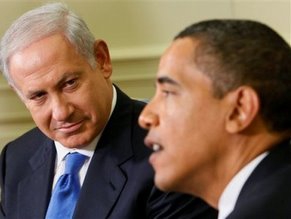|
World Jewish News

US President Obama is to meet Israeli Prime Minister Benjamin Netanyahu at the White House on Monday.
|
Barack Obama says he is ‘not bluffing’ about attacking Iran if it builds a nuclear weapon
02.03.2012, Israel and the World US President Barack Obama said that he is not bluffing about attacking Iran if it builds a nuclear weapon, but in an interview published Friday he also warned Israel that a premature attack on Iran would allow Tehran to play the "victim".
In the interview with Jeffrey Goldberg of The Atlantic magazine he said that "a military component" is among a mix of many options for dealing with Iran, along with sanctions and diplomacy.
Asked by the reporter to elaborate about the expression "all options are open" which is seen by the Israeli government as a "vague", Obama replied: "I think the Israeli people understand it, I think the American people understand it, and I think the Iranians understand it."
"It means a political component that involves isolating Iran; it means an economic component that involves unprecedented and crippling sanctions; it means a diplomatic component in which we have been able to strengthen the coalition that presents Iran with various options through the P-5 plus 1 (the five permanent members of the U.N. Security Council plus Germany) and ensures that the IAEA (International Atomic Energy Agency] is robust in evaluating Iran’s military program; and it includes a military component," the president said.
He continued: "I think that the Israeli government recognizes that, as president of the United States, I don’t bluff. I also don’t, as a matter of sound policy, go around advertising exactly what our intentions are. But I think both the Iranian and the Israeli governments recognize that when the United States says it is unacceptable for Iran to have a nuclear weapon, we mean what we say."
Obama’s comments appeared aimed more at Israel and its supporters in the United States than at Iran. The US President is to address the annual conference of the American Israel Public Affairs Committee (AIPAC) on Sunday and is to meet with Israeli Prime Minister Benjamin Netanyahu Monday at the White House. Nuclear Iran is clearly a major issue for American Jewish voters in this election year.
Netanyahu will also address AIPAC . Three Republican primaries contenders, Mitt Romney, Rick Santorum and Newt Gingrich will also speak at the pro-Israel organization gathering in Washington which is expected to be attended by a over 10,000 people.
According to the US media, Obama will try to convince Netanyahu to postpone any plans his government may have to unilaterally attack Iran’s nuclear facilities in coming months.
An attack could allow Iran to paint itself the victim and draw new support that would undermine rather than enhance Israel’s security, Obama warned.
"At a time when there is not a lot of sympathy for Iran and its only real ally (Syria) is on the ropes, do we want a distraction in which suddenly Iran can portray itself as a victim?,” Obama said.
Obama's goal in his talks with Netanyahu is to convince him that the United States "has Israel's back" so that Israel has no need to rush toward air strikes on Iran’s nuclear facilities.
Israeli President Shimon Peres told the New York Times Thursday that the United States must make it clear to Iran that "all options are on the table."
"We need a total and clear commitment that the catastrophe of Iran will not create an impossible situation," Peres said, acknowledging there was disagreement over where to draw the red line that would spark military action.
In The Atlantic interview, Obama admitted to differences with Netanyahu describing their relationship as one focused on business and noting they came from different political traditions.
"But one thing I have found in working with Prime Minister Netanyahu is that we can be very frank with each other, very blunt with each other, very honest with each other," he said.
"For the most part, when we have our differences, they are tactical and not strategic," he said. "We have a common vision about where we want to go."
"At any given moment -- as is true, frankly, with my relationship with every other foreign leader -- there's not going to be a perfect alignment of how we achieve these objectives," he said.
EJP
|
|
